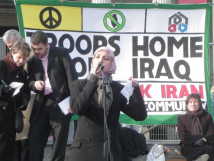Channel 4 has sparked fury by planning an “alternative” Christmas Day message delivered by a Muslim woman in a veil.
Radical Khadija Ravat, who lectures on Islam, will appear on its screens while the Queen is giving her traditional afternoon speech on the other channels. Mrs Ravat’s talk is expected to focus on the heated debate about the veil following the recent case of teacher Aishah Azmi losing her battle to wear it in the classroom.
Evangelical lobby group Christian Voice’s Stephen Green said the alternative message will “put people’s backs up”. He added: “The niqab is a veil of separation between Muslims and the indigenous Christian community. This will expose multi-culturalism for what it is – a bias against the Christian population.”
Tory MP Philip Davies, who represents Shipley, West Yorkshire, said: “It seems Channel 4 is being provocative towards Christians. I would recommend listening to what the Queen has to say. Kick Channel 4 into the long grass. You would think that for one day of the year, during what is still just about a Christian festival, they could leave political correctness alone.”
Mrs Ravat, 33, a radical Islamist from Leicester, spoke out about the veil after ex-Foreign Secretary Jack Straw declared it made community relations more difficult.
Daily Express, 6 December 2006
Call me an old sceptic, but given Channel 4’s past record in stoking up Islamophobia you suspect this is the exactly reaction they set out to provoke.

 “Unfortunately, despite the intentions of its authors, I fear that their focus on attacking the currently dominant faith organisations will generate more heat than light. In conflating HT with the BNP as if they both pose equal threats to race relations; in echoing in all but name the charge of ‘Islamofascist’ against organisations like MCB; in regurgitating, along with the government and rightwing tabloids, the spectre of sinister self-appointed Muslim community leaders who keep the their foot firmly on the neck of their communities; the manifesto only serves to add more layers of confusion than strip them away.”
“Unfortunately, despite the intentions of its authors, I fear that their focus on attacking the currently dominant faith organisations will generate more heat than light. In conflating HT with the BNP as if they both pose equal threats to race relations; in echoing in all but name the charge of ‘Islamofascist’ against organisations like MCB; in regurgitating, along with the government and rightwing tabloids, the spectre of sinister self-appointed Muslim community leaders who keep the their foot firmly on the neck of their communities; the manifesto only serves to add more layers of confusion than strip them away.”